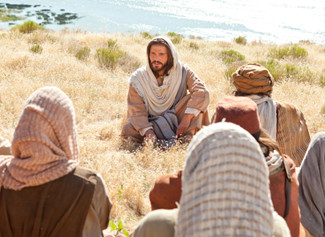The Gospel passages chosen for the next few Sundays comprise the substance of what we traditionally know as "the Sermon on the Mount." These words of Jesus as recounted by Matthew make up the heart of the Gospel, the substance of the "Good News." The evangelist spends of lot of time - one hundred and eleven verses - making sure that this message would be remembered down through the ages. The Sermon on the Mount represents the New Sinai, the new Covenant, the NEW Commandment. It is the summary of all that it means to be Christian - all that it means to be fully human.
 The quality or value of any sermon is only measured by the effect it has on the lives of those who hear it and on the community of the human family. Keeping the commandments of God and living according to the Gospel of Jesus is not just a matter of personal holiness. If the gift of faith enables us to hear the Word of God and live by it, then we are expected to share that gift with others. If we are redeemed and sanctified by the life, death and resurrection of Jesus, then we, too, are sent by Him to redeem and sanctify our world in His name.
The quality or value of any sermon is only measured by the effect it has on the lives of those who hear it and on the community of the human family. Keeping the commandments of God and living according to the Gospel of Jesus is not just a matter of personal holiness. If the gift of faith enables us to hear the Word of God and live by it, then we are expected to share that gift with others. If we are redeemed and sanctified by the life, death and resurrection of Jesus, then we, too, are sent by Him to redeem and sanctify our world in His name.
The Beatitudes are for living not just listening. These are not just words to be memorized. We don't just keep them handy in a notebook that we can occasionally refer to. We don't just preach them to our children and to our neighbors. Jesus expects much more than that and warns that the salt can go flat and tasteless, the light can be hidden and useless and that we can easily blind ourselves to the truth.
Christian living requires work, lots of sacrifice, discipline and love. It takes heroic love to enflesh the Beatitudes in our relationships. It's not really easy to be poor, to be merciful, to be meek, to be peacemakers, to hunger and thirst for justice. It takes courage to be persecuted and ridiculed and mocked for being authentic Christians, for being Christ-like. It takes faith and trust in God to admit our own weaknesses and dependence upon one another rather than looking at each other's faults.
At the heart of the Gospel is the insistence of Jesus that our love be "all-inclusive," with no exception. And that is probably the most difficult thing about being an authentic Christian. Almost instinctively our love tends to be exclusive. We are comfortable with people who are like us, in color, religion, and economic status. We find it easy to be good to those who like us, those who are attentive to us, those who understand us.
We cannot exclude anyone - not the beggar, the borrower, the adulteress, the leper, the widow, the poor, the orphan, the enemy. Each of us can make our own list of the "most unwanted", those whom we find most difficult to forgive, to feel sympathy for, to offer compassion to.
Living the Beatitudes is indeed a constant challenge. It is a challenge that makes us reexamine our mental attitudes, our actions, our speech, and many of the prejudices we grew up with. This challenge leads to authentic Christianity through which we can become more sensitive to the ways that we exclude certain people from the embrace of our love. It can lead us to strip away the deep-rooted suspicions we nurture against persons who, in some way, are "different" from us.
The Beatitudes certainly give us an upside down way to look at our lives and the world in which we live. They really don’t tell us how we ought to behave or live our lives. They are not Jesus’ own Ten Commandments. They are not commandments at all, not a code of ethics for the Christian community, not directives that will better help us follow the model behavior of Christ. Rather, Jesus is saying that we who live the Beatitudes are already blessed. We are enabled to live as he did in a world that does not always accept him.
And because of this we are able to proclaim by our words and actions the presence of God in the world.





